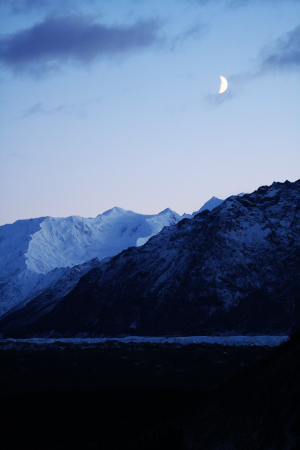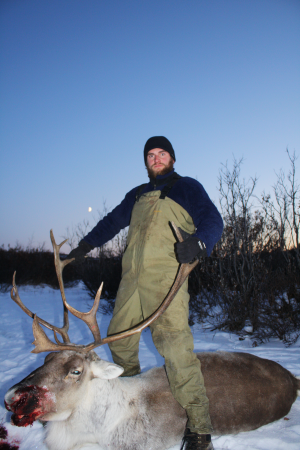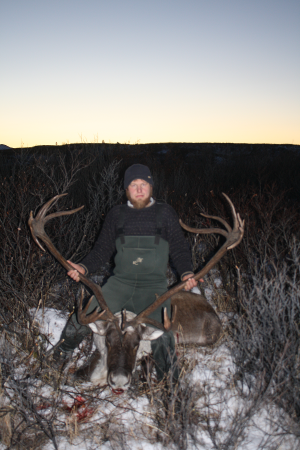A hunt to remember
This past weekend my brother Mark and I traveled 250 miles north to hunt caribou. We haven’t been hunting on a multi-day trip since high school, so it was fortunate that we were able to hunt together after many years. Below is the abridged version of our hunt:
 The snow had already graced the mountains here in Southcentral Alaska, and the forecast was calling for clear and cold weather up north. Mark and I left town at 4pm in his old pickup truck, pulling two old four-wheelers behind. The drive from Chugiak to Paxson is always a beautiful drive, but especially with cloudless skies and snow on the peaks, and we stopped a few times to take pictures of the scenery. We arrived in Paxson after dark and set up our tents in an old gravel pit near the banks of the Gulkana River as the temperature dipped to 0 degrees Fahrenheit.
The snow had already graced the mountains here in Southcentral Alaska, and the forecast was calling for clear and cold weather up north. Mark and I left town at 4pm in his old pickup truck, pulling two old four-wheelers behind. The drive from Chugiak to Paxson is always a beautiful drive, but especially with cloudless skies and snow on the peaks, and we stopped a few times to take pictures of the scenery. We arrived in Paxson after dark and set up our tents in an old gravel pit near the banks of the Gulkana River as the temperature dipped to 0 degrees Fahrenheit.
Sleeping inside of a sleeping bag is always a challenge, especially when confronted with the absurd contradictions of winter camping. Terrifying claustrophobia is just as bad as the cold that wakes you up if your face is exposed to the air. The contradictory desires of needing to pee and wanting to stay warm inside your cocoon can lead to an existential crisis. Somehow, we survived.
We woke up before dark, thawed our frozen pastries on the dash of my brother’s truck and sipped french press coffee, admiring the stars. The milky way in a northern night sky is breathtaking, and for all that we’ve gained through our technology, I can’t help but mourn the loss of dark and starry nights in our light-polluted world.
We drove through the darkness into the Alaska Range in order to spot caribou at first light. At 0 degrees, the four wheelers didn’t want to start or roll and after two hours of cursing, building tarp tents to warm the machines, and messing with an ill-tempered propane heater, we got one of the machines running. I sent Mark up the mountainside on the working ATV while I continued to tinker with the other machine. Eventually, I tried to make my way up the mountain, only to have my machine die and refuse to start. As I sat on the hillside, I could see Mark on his four wheeler. Suddenly, he jumped off and ran to an nearby boulder where he hid himself. Caribou must be coming.
As I watched my brother, two hunters walked past me on the trail. I heard a gunshot nearby, and the sound of a bullet ricocheting to my left. One of the hunters looked at me with concern.
Hunting for caribou on the Denali Highway is like combat fishing — with guns. I watched as four different groups o hunters descended on a small herd of caribou from four different directions. The two bulls in the herd didn’t stand a chance. After another gunshot, both bulls had been taken and the herd ran off into the mountains, nearly running my brother over in the process.
We decided to continue down the road.
We saw several other caribou herds over the course of the day, but they were either too far away or too many hunters were converging on them. We eventually found a small herd near the road. With hunters on a couple of nearby hills, we nonetheless attempted a stalk. Crossing a half-frozen swamp, I broke through the ice and filled one of my winter boots. A little worried my feet would freeze, we pressed on. Suddenly, the herd, which had been spooked by other hunters, started running across the swamp. A small bull was in the back. “Shoot that mother—ker!” I yelled at my brother. I ripped off my scope cover (never to be seen again) and fired two shots at the bull as he ran away at over 250 yards. He ran over the hill just as healthy and happy as when I first saw him. They don’t call me “Trigger” for no reason…
After our failed stalk we decided to drive past our camp and to head north of Paxson on the Richardson Highway, as that was where we saw the most sign. The sun was beginning its slow descent into the south-western sky. We saw a few caribou in the distance , but none of them were close enough to warrant a stalk.
Turning north on the Richardson Highway from Paxson, the highway immediately enters a small canyon. To the left are steep bluffs and the east fork of the Gulkana River. We could see caribou paths descending the ridges. I commented to Mark how difficult it would be to shoot a caribou in this area. One would have to wait for the caribou to descend the bluff, cross the river, and cross the road in order to shoot it literally in the ditch.
Several miles north of Paxson the canyon begins to disappear as the Gulkana River gives way to Summit Lake, from which it flows. As we drove towards the lake we saw a line of four trucks pulled over to the side of the highway — a sure sign that caribou were visible. Sure enough, on the opposite hillside, on the far banks of the river, were a heard of caribou. Upon further inspection, we saw that they were mostly bulls — big bulls.
Mark and I got really excited. A group of large bull caribou were clearly trying to cross the river and the highway right in front of us. There was only one problem. Three trucks full of over-eager hunters were parked behind us, waiting for their chance to rain down bullets on the caribou herd. I could envision fistfights and arguments as each hunter tried to shoot the biggest bull simultaneuously as they crossed the river. Luckily, Mark and I had an advantage.
Before we left Chugiak, we had both decided to throw a pair of chest waders into the truck for good measure. We didn’t really consider that it would be so cold in Paxson, we simply figured the waders might come in handy. Indeed they did. We realized that we could shoot the caribou before they crossed the river and before the caribou herd became a caribou buffet.
Mark and I got ran out of the truck with our guns. Neither of us were wearing gloves or coats, and Mark didn’t have a hat. We raced to a line of alder trees near the highway and waited as we watched the herd come closer. Two other hunters got out of their trucks and came up to us. “Your not going to shoot them across the river, are you?” one asked. “You need to wait for them to cross the river so we can all get a chance at them.”
“We have chest waders,” we replied, watching his face fall as he realized we would shoot them before he had the chance.
Here’s where I must confess the “dick move” that I made during these critical moments. As we crossed the roads with our guns, I asked Mark, “Do you want to shoot the first one?”
“Sure,” he replied.
As the caribou got closer, I whispered to my brother “don’t shoot, don’t shoot” waiting for them to get nearer to us. Dutifully, he did not shoot. Then, as the herd continued to approach…BANG! A large bull stood broadside to me at about 150 yards and I shot him.
“Was that you shooting?” Mark asked.
“Yes” I said sheepishly.
I still feel bad that I took the first shot. It was almost an automatic reflex, and I definitely deserve the ass-hole hunting buddy award for that one. Thankfully, Mark has been very gracious about it all.
The herd was confused for a moment, and the largest bull in the herd presented itself, but with a difficult shot. Mark fired once and missed, and the herd retreated into the brush. What happened next is still a matter of speculation, but either the same herd came back, trying to cross the river, or another herd arrived. Regardless, ten minutes later a herd of big caribou walked through the brush, directly toward us. They were directly facing us, and packed close together in the brush, creating difficult shooting conditions. Mark lined up his shot on a nice bull that had pulled away from the rest of the herd and shot him just before he crossed the river.
 For Mark and I, the air was filled with jubilation. For the hunters in their trucks on the highway behind us, the air was full of disappointment and they began to slowly drove away.
For Mark and I, the air was filled with jubilation. For the hunters in their trucks on the highway behind us, the air was full of disappointment and they began to slowly drove away.
“What have we just done?” I asked Mark with a big grin on my face. The work was just beginning.
Before we shot the caribou, we had taken a very cursory glance at the river. It looked like there were shallow places we could cross, but we hadn’t looked very closely. Now we had no choice. We dawned our waders, grabbed our knives, game bags, and camera, and headed to the river. Thankfully, the river wasn’t terribly deep. It was only knee-high at the worst, and while the rocks were slippery, there were big stones one could wedge one’s foot between to cross. We quickly took pictures of our kills as the light began to fade and the cold began to creep into our skin.
While we knew we could get through the river, we hadn’t thought about what would happen when our wet waders and shoes began to freeze. I took my waders off because my feet were already becoming cold, while Mark left his waders on because he still felt comfortable. We got to work skinning the first caribou just as the last light left the sky, with only our headlamps and an emergency lamp to light our work.
We worked for about three hours to clean the two caribou. Mark’s boots and waders froze together into an inpermeable layer of ice. Even if his feet were cold, he couldn’t take his waders and shoes off. I had changed into my winter boots, but my waders and boots froze solid. I wasn’t sure I’d be able to get them back on. All the while, an Alaska State Trooper watched us from the highway, afraid we would drown while crossing the river in the dark. Mark eventually reassured him and he drove away.
After the caribou was cut up and bagged, we began the process of ferrying it across the river. I had to soak my boots and waders in the creek to get them on and Mark’s ice-encased feet were beginning to get really cold.
Crossing the river in the middle of the night presented it’s own challenges. One had to point their headlight into the water in order to see the rocks, being careful not to fall down while balancing caribou quarters on one’s back. We made it across without any big falls and quickly threw the caribou into the truck and began to drive back to camp.
 We got back to camp near midnight and sat in the truck for a few minutes, enjoying the warmth of the cab before making a quick dinner and crawling into our sleeping bags. It’s was brutally cold.
We got back to camp near midnight and sat in the truck for a few minutes, enjoying the warmth of the cab before making a quick dinner and crawling into our sleeping bags. It’s was brutally cold.
Mark’s feet had not thawed out in the truck. If anything, they were colder from lack of movement. We were presented with two options: cutting the frozen boots away from his feet with a knife or pouring boiling water on his boots. We elected for the boiling water. Mark practically purred when I poured the water over his feet. It warmed up his toes and melted the ice enough for him to squeeze his feet out of the boots and waders and into a pair of winter boots.
We jumped into our sleeping bags, hollering at the cold, and sleep came quickly.
The next morning, the overwhelming need to pee eventually won out against the instinctive desire to stay warm in the sleeping bag. We got up 8:30 and thawed pastries on the dashboard again. Looking at the giant pile of meat and the big antlers lying on the ground, the first full sentence I spoke that morning, in a type of hung-over, cold stupor was “What the hell did we do last night?”
We packed up our tents, loaded the meat, and began the long and beautiful drive back to Chugiak.
Besides the great memories made with my brother (we both agreed there’s no one we would have rather experienced that hunt with) it always feels good to come home from a wild harvest. We cut up around 170 lbs of caribou, much of which will be made into summer sausage and jerky. The scenery, camaraderie and the good, hard work of a weekend in the wild gives one a sense of peace, calm, and accomplishment that is hard to find in a post-modern world. As Wordsworth says, “in this moment there is life and food for future years.” The sense of peace in the wilderness, at least for me, seems enough to keep me going in a busy suburban world until I can again escape to the woods.